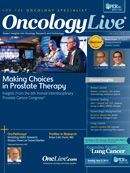Study Suggests Role for Targeting HER2 in Non-Small Cell Lung Cancer
Mutations of the HER2 gene in patients with non-small cell lung cancer, though rare, potentially could be treated with HER2-targeted drugs.
Mutations of the human epidermal growth factor receptor 2 (HER2) gene in patients with non-small cell lung cancer (NSCLC), though rare, potentially could be treated with HER2-targeted drugs, according to a retrospective study in the Journal of Clinical Oncology.
HER2 mutations are more closely associated with certain types of breast cancer, but HER2 protein overexpression occurs in 6% to 35% of patients with NSCLC, and HER2 gene amplification occurs in 10% to 20% of patients. Actual mutations of the HER2 gene only occur in 1% to 2% of patients with NSCLC, and are more frequently observed in female patients, nonsmokers, and patients with the adenocarcinoma subtype.
Because a number of HER2-targeted agents, including trastuzumab, pertuzumab, and lapatinib, have already been approved to treat other tumor types, it may be that these agents could be used to successfully treat HER2-mutated NSCLC. Previous studies of HER2-targeted therapies in patients with NSCLC showed only a minimal benefit, but those studies were conducted in patients with HER2 overexpression but not necessarily a HER2 mutation.
In this retrospective study, mutations of HER2 were identified in 65 out of 3800 (1.7%) patients with NSCLC in France, Switzerland, and Spain. Patients with mutated HER2 were mainly female (45 women vs 20 men), never-smokers (n = 34; 52.3%), and had adenocarcinomas, with approximately 50% of patients identified as having stage IV disease at the time of diagnosis. These characteristics matched the patient profile of HER2- mutated NSCLC suggested by previous studies.
A total of 33 patients with stage IV or recurrent NSCLC received conventional chemotherapy (a platinum-based doublet with or without bevacizumab). Of those, 16 patients also received HER2-targeted therapies. Some patients received either two (n = 3) or four (n = 1) different HER2-targeted drugs; a total of 22 individual anti-HER2 treatments were evaluable across the 16 patients.
Of the 16 patients, four had progressive disease, seven had disease stabilization, and 11 had partial responses, with an overall response rate of 50% and a disease control rate (DCR) of 82%. The DCR was 93% in patients who received trastuzumab-based therapies (n = 15) and 100% in patients who received afatinib (n = 3). However, no response to other targeted therapies was observed (n = 3). The median progression-free survival for patients who received HER2-targeted therapies was 5.1 months. The median survival was 89.6 months in patients with early-stage disease and 22.9 months in patients who had stage IV disease.
“Our study suggests that many patients with HER2 mutations may benefit from anti-HER2 drugs,” said lead author Julien Mazières, MD, PhD, professor of Pulmonology at Larrey Hospital in Toulouse, France, in a statement. “While this benefit still needs to be confirmed in a prospective clinical trial, we hope that, based on this and other studies, HER2 status will be taken into account when making treatment decisions.”
Mazières J, Peters S, Lepage B, et al. Lung cancer that harbors a HER2 mutation: epidemiologic characteristics and therapeutic perspectives [published online ahead of print April 22, 2013]. J Clin Oncol. doi:10.1200/JCO.2012.45.6095.




